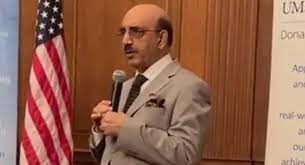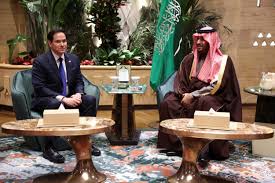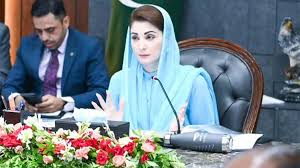No misunderstanding with US over Pakistan’s purchase of Russia’s discounted oil: Masood Khan

Washington: There’s no misunderstanding between the United States and Pakistan over Islamabad’s move to buy discounted Russian oil, Ambassador Masood Khan has said, while underscoring that the reset Islamabad-Washington relationship is “transcending the past.”
“We have placed the first order for Russian oil, and this has been done in consultation with the United States government; There’s no misunderstanding between Washington and Islamabad on this count,” he said in response to a question at a conference organized by the Wilson Center’s South Asia Institute, a Washington-based think-tank, on the future of relations between the two countries.
The questioner had suggested the energy purchase from Russia could adverse impact on Pakistan’s already difficult relationship with the U.S.
“They (U.S.) have suggested that you are free to buy anything below or up to the price cap (set by G-7 nations), and we have abided by that agreement,” the Pakistani envoy said. “I think Washington is fine with that,” Ambassador Khan added.
Last December, G7 and EU countries set a price cap of $60 per barrel on Russian oil in a move aimed at preventing Moscow from using the revenues to finance its war against Ukraine.
Earlier this year, a State Department spokesperson said that Pakistan can purchase oil from Russia at a discounted price even though it has not signed the price-cap on Russian petroleum products, pointing out that Washington recognizes the pressure governments face to secure affordable fuel.
In his address to the conference, Ambassador Masood Khan said that Pakistan’s ties with the United States had suffered a “brief period of uncertainty” after the U.S.-led foreign military withdrawal from Afghanistan in August 2021, when the Taliban seized control of the country.
He said the relationship with the U.S. was back on track and both sides were working to boost economic and security partnerships.
Elizabeth Horst, a senior State Department official who also spoke at the Wilson Center conference Thursday, concurred. She said the last year had helped reset the U.S.-Pakistan relationship.
The two countries held mid-level defence dialogues in Washington and a counter terrorism working group in Islamabad in February and March, respectively, she said.
In this regard, the Pakistani envoy said the two states were successfully “recalibrating and rejuvenating” their relations in the wake of changing circumstances.
“The results in a short span of time are impressive,” he said.
Referring to frequent high-level contacts between Foreign Minister Bilawal Bhutto Zardari and U.S. Secretary of State Anthony Blinken, Pak-US dialogues on health, energy, climate change, counter-narcotics, counterterrorism and defence and the recently held Trade and Investment Framework Agreement (TIFA) Ministerial Council meeting, the Ambassador said that these processes were producing results and defining pathways for future growth.
“They are also creating a structure for an overarching, multi-dimensional dialogue”, he continued.
The Ambassador said that Pakistan’s Foreign Minister would be attending the Shanghai Cooperation Organization (SCO) Conference in Goa early next month. “The context is multilateral, not bilateral. Let’s hope that this decision goes down well to bolster diplomacy.”
Islamabad values Washington’s encouragement to India and Pakistan to engage, he said, adding that the “US could act as a catalyst to help resolve the Jammu and Kashmir dispute which has kept the region on the brink of war.”
Cautioning about the serious perils of the policy of imbalance in South Asia, Ambassador Masood Khan also urged the US to “revive its role on strategic stability in South Asia”. “It is important that the US restores – for Pakistan – Foreign Military Financing and Foreign Military Sales, suspended by the previous Administration,” he said.
Pakistan, he said, seeks to forge strong ties with the US and make them stronger. “We do not believe our relations with China should affect them in any way.
We earnestly hope that the US, the shining city upon a hill, and China, an emerging power, using their statesmanship, will opt for cooperation and competition rather than a confrontation that can plunge the globe into strife or worse,” he said.
“Pakistan offers to build bridges in good faith and facilitate communication between the two powers, if they so desire, as it did back in the 1970s”
Ms. Horst, Principal Deputy Assistant Secretary of State, said that the Pak-US relationship was “one of the most consequential for each other, for South Asia and for the world.”
Noting close cooperation between the two countries in a host of areas including trade and investment, climate change, security and regional security, Ms. Horst highlighted TIFA (Trade and Investment Framework Agreement) meeting that is setting the stage for greater interaction between the two countries. She termed Green Alliance and the collaboration in energy security and climate change as the new anchor to further advance bilateral ties.
“I see real future in the areas of energy and climate, trade and investment and cooperation on regional security.”
On the security front, Ms. Horst observed that US was more aligned than ever with Pakistan on how to prevent Afghanistan from becoming a base for terrorism.
“We both want a region where terrorists pose no threats and borders are respected. We are looking now at how we can cooperate with Pakistan on counterterrorism, counter-narcotics, anti-human trafficking and we are working to ensure that Afghanistan is never again (becomes) a base for terrorism” she said.
Noting US assistance to flood affectees, Ms. Horst also underscored the role of vibrant Pakistani diaspora in the United States and forums like the US-Pakistan Women’s Council in bringing the peoples of the two countries closer to each other.
On people-to-people exchanges particularly ties in the education sector, Ms. Horst observed that young people were the future of the relationship and that’s why the United States continued to invest in education. In this context. she referred to approximately 800 Pakistani students visiting United States every year on various exchange programmes and the presence of thousands of others in universities across the country.
“That is an investment in the future,” she said.
Referring to Pakistan’s ties with the world, Ms. Horst said that “Pakistan is a sovereign country. It has made and always will make its own choices. It has a lot of partnerships. The United States respects that.”
“A strong prosperous and democratic Pakistan is essential for the interests of both our countries and both our peoples. The best way to do that is through continued cooperation.”
In his remarks, Ambassador Khan expressed appreciation for US assistance to Pakistan in generating green energy and modernizing its agriculture through Green Alliance observing that these measures would prepare Pakistan to respond effectively to climate-induced disasters and “keep ourselves in step with the fast transforming global economy.”
“In the wake of last year’s devastating floods, the US has become our partner in building a climate-resilient, inclusive economy, with emphasis on food security, health, women empowerment, social protection and infrastructure development,” he said.
On efforts to promote greater economic connectivity, Ambassador Khan said that Pakistan foresee the US catalyzing the country’s integration into the global supply chains. “The areas mature for such cooperation are agriculture, biotechnology, medicine, manufacturing and tech industry,” he said.
Among others who spoke at the conference were: Michael Kugelman, Director South Asia Institute; Ghazanfar Hashmi, President International Academy of Letters, USA; Dr. Hassan Abbas; Esperanza Gomez Jelalian; Ms. Kalsoom Lakhani; Baqir Sajjad; Ms. Jumaina Siddiqui; Ms. Ambereen Mirza; Rick Khan; Nasruddin Rupani and Dr. Asaf Qadeer.





